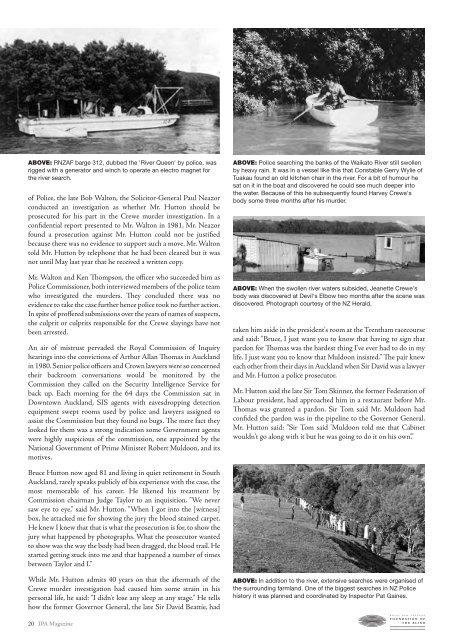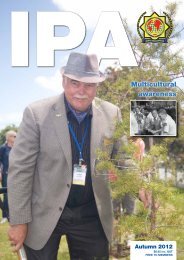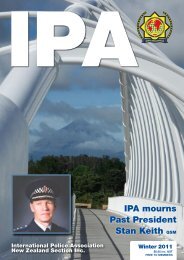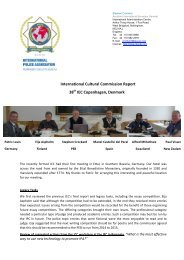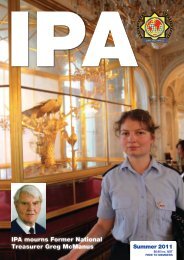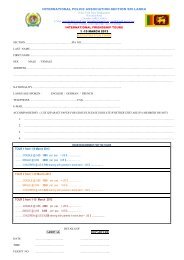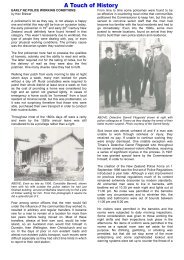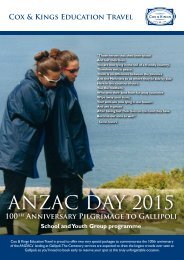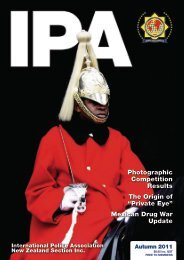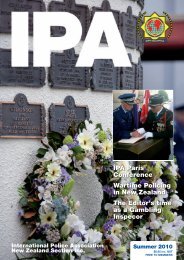The Crewe Murders - Ipa.org.nz
The Crewe Murders - Ipa.org.nz
The Crewe Murders - Ipa.org.nz
You also want an ePaper? Increase the reach of your titles
YUMPU automatically turns print PDFs into web optimized ePapers that Google loves.
ABOVE: RNZAF barge 312, dubbed the 'River Queen' by police, was<br />
rigged with a generator and winch to operate an electro magnet for<br />
the river search.<br />
of Police, the late Bob Walton, the Solicitor-General Paul Neazor<br />
conducted an investigation as whether Mr. Hutton should be<br />
prosecuted for his part in the <strong>Crewe</strong> murder investigation. In a<br />
confidential report presented to Mr. Walton in 1981, Mr. Neazor<br />
found a prosecution against Mr. Hutton could not be justified<br />
because there was no evidence to support such a move. Mr. Walton<br />
told Mr. Hutton by telephone that he had been cleared but it was<br />
not until May last year that he received a written copy.<br />
Mr. Walton and Ken Thompson, the officer who succeeded him as<br />
Police Commissioner, both interviewed members of the police team<br />
who investigated the murders. <strong>The</strong>y concluded there was no<br />
evidence to take the case further hence police took no further action.<br />
In spite of proffered submissions over the years of names of suspects,<br />
the culprit or culprits responsible for the <strong>Crewe</strong> slayings have not<br />
been arrested.<br />
An air of mistrust pervaded the Royal Commission of Inquiry<br />
hearings into the convictions of Arthur Allan Thomas in Auckland<br />
in 1980. Senior police officers and Crown lawyers were so concerned<br />
their backroom conversations would be monitored by the<br />
Commission they called on the Security Intelligence Service for<br />
back up. Each morning for the 64 days the Commission sat in<br />
Downtown Auckland, SIS agents with eavesdropping detection<br />
equipment swept rooms used by police and lawyers assigned to<br />
assist the Commission but they found no bugs. <strong>The</strong> mere fact they<br />
looked for them was a strong indication some Government agents<br />
were highly suspicious of the commission, one appointed by the<br />
National Government of Prime Minister Robert Muldoon, and its<br />
motives.<br />
Bruce Hutton now aged 81 and living in quiet retirement in South<br />
Auckland, rarely speaks publicly of his experience with the case, the<br />
most memorable of his career. He likened his treatment by<br />
Commission chairman Judge Taylor to an inquisition. "We never<br />
saw eye to eye," said Mr. Hutton. "When I got into the [witness]<br />
box, he attacked me for showing the jury the blood stained carpet.<br />
He knew I knew that that is what the prosecution is for, to show the<br />
jury what happened by photographs. What the prosecutor wanted<br />
to show was the way the body had been dragged, the blood trail. He<br />
started getting stuck into me and that happened a number of times<br />
between Taylor and I."<br />
While Mr. Hutton admits 40 years on that the aftermath of the<br />
<strong>Crewe</strong> murder investigation had caused him some strain in his<br />
personal life, he said: "I didn't lose any sleep at any stage." He tells<br />
how the former Governor General, the late Sir David Beattie, had<br />
20 IPA Magazine<br />
ABOVE: Police searching the banks of the Waikato River still swollen<br />
by heavy rain. It was in a vessel like this that Constable Gerry Wylie of<br />
Tuakau found an old kitchen chair in the river. For a bit of humour he<br />
sat on it in the boat and discovered he could see much deeper into<br />
the water. Because of this he subsequently found Harvey <strong>Crewe</strong>'s<br />
body some three months after his murder.<br />
ABOVE: When the swollen river waters subsided, Jeanette <strong>Crewe</strong>'s<br />
body was discovered at Devil's Elbow two months after the scene was<br />
discovered. Photograph courtesy of the NZ Herald.<br />
taken him aside in the president's room at the Trentham racecourse<br />
and said: "Bruce, I just want you to know that having to sign that<br />
pardon for Thomas was the hardest thing I've ever had to do in my<br />
life. I just want you to know that Muldoon insisted." <strong>The</strong> pair knew<br />
each other from their days in Auckland when Sir David was a lawyer<br />
and Mr. Hutton a police prosecutor.<br />
Mr. Hutton said the late Sir Tom Skinner, the former Federation of<br />
Labour president, had approached him in a restaurant before Mr.<br />
Thomas was granted a pardon. Sir Tom said Mr. Muldoon had<br />
confided the pardon was in the pipeline to the Governor General.<br />
Mr. Hutton said: "Sir Tom said 'Muldoon told me that Cabinet<br />
wouldn't go along with it but he was going to do it on his own'."<br />
ABOVE: In addition to the river, extensive searches were <strong>org</strong>anised of<br />
the surrounding farmland. One of the biggest searches in NZ Police<br />
history it was planned and coordinated by Inspector Pat Gaines.


